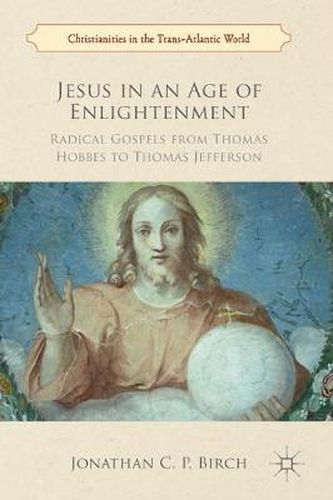Readings Newsletter
Become a Readings Member to make your shopping experience even easier.
Sign in or sign up for free!
You’re not far away from qualifying for FREE standard shipping within Australia
You’ve qualified for FREE standard shipping within Australia
The cart is loading…






This title is printed to order. This book may have been self-published. If so, we cannot guarantee the quality of the content. In the main most books will have gone through the editing process however some may not. We therefore suggest that you be aware of this before ordering this book. If in doubt check either the author or publisher’s details as we are unable to accept any returns unless they are faulty. Please contact us if you have any questions.
This book explores the religious concerns of Enlightenment thinkers from Thomas Hobbes to Thomas Jefferson. Using an innovative method, the study illuminates the intellectual history of the age through interpretations of Jesus between c.1650 and c.1826. The book demonstrates the persistence of theology in modern philosophy and the projects of social reform and amelioration associated with the Enlightenment. At the core of many of these projects was a robust moral-theological realism, sometimes manifest in a natural law ethic, but always associated with Jesus and a commitment to the sovereign goodness of God. This ethical orientation in Enlightenment discourse is found in a range of different metaphysical and political identities (dualist and monist; progressive and radical) which intersect with earlier ‘heretical’ tendencies in Christian thought (Arianism, Pelagianism, and Marcionism). This intellectual matrix helped to produce the discourses of irenic toleration which are a legacy of the Enlightenment at its best.
$9.00 standard shipping within Australia
FREE standard shipping within Australia for orders over $100.00
Express & International shipping calculated at checkout
This title is printed to order. This book may have been self-published. If so, we cannot guarantee the quality of the content. In the main most books will have gone through the editing process however some may not. We therefore suggest that you be aware of this before ordering this book. If in doubt check either the author or publisher’s details as we are unable to accept any returns unless they are faulty. Please contact us if you have any questions.
This book explores the religious concerns of Enlightenment thinkers from Thomas Hobbes to Thomas Jefferson. Using an innovative method, the study illuminates the intellectual history of the age through interpretations of Jesus between c.1650 and c.1826. The book demonstrates the persistence of theology in modern philosophy and the projects of social reform and amelioration associated with the Enlightenment. At the core of many of these projects was a robust moral-theological realism, sometimes manifest in a natural law ethic, but always associated with Jesus and a commitment to the sovereign goodness of God. This ethical orientation in Enlightenment discourse is found in a range of different metaphysical and political identities (dualist and monist; progressive and radical) which intersect with earlier ‘heretical’ tendencies in Christian thought (Arianism, Pelagianism, and Marcionism). This intellectual matrix helped to produce the discourses of irenic toleration which are a legacy of the Enlightenment at its best.